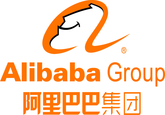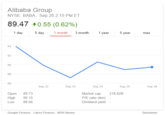Alibaba
Part of a series on China. [View Related Entries]
| Navigation |
| About • History • Services • Controversies • Traffic • Search Interest • External References • Recent Images • Recent Videos |
About

Alibaba is a Chinese multinational Internet e-commerce business made of several websites, payment services a search engine and cloud computing services.
History
In December 1998, Chinese entrepreneur Jack Ma[4] collaborated with 17 other co-founders to establish the online retail service “Alibaba Online.” According to Ma, he came up with the name for the site, "Alibaba," after the titular character from the well-known Arabic folk tale Ali Baba and the Forty Thieves, while sitting at a coffee shop one day in San Francisco. In October 2005, Alibaba partnered with Yahoo! Inc to operate China Yahoo! Inc On May 10th, 2013, Ma stepped down as the Alibaba Group chief executive officer (CEO) to become executive chairman, being replaced by Jonathan Lu as the company’s new CEO.
IPO
On September 5th, 2014, Alibaba was priced at $60 to $66 per share for its initial public offering (IPO) in a regulatory filing by the United States Securities and Exchange Commission. On the following day, Big News Network[2] reported that the listing was expected to reach upwards of $20 billion on the New York Stock Exchange (NYSE) to become the largest tech listing in U.S. history. On September 22nd, the Alibaba IPO was raised to $25 billion after Alibaba’s underwriters announced they would be selling investors more shares than originally planned. As of September 26th, Alibaba Group has a NYSE share price of $89.47 (shown below).

Services
Alibaba: Business-to-Business Service
On April 4th, 1999, Ma launched Alibaba.com[3] as a business-to-business website to link Chinese manufacturers and overseas buyers. That year, Alibaba Group raised $25 million in investment from major banks and institutions overseas, including Softbank, Goldman Sachs and Fidelity.
Taobao: Retail Market Place
In 2003, the Alibaba Group launched the Chinese online shopping platform Taobao Marketplace.
Alipay: Online Payment Service
In 2004, Alibaba made the Alipay online payment and escrow service, used as a Chinese version of PayPal.
Tmail
In April 2008, Alibaba created the Tmail online retailer platform.
Cloud Computing
In September 2009, the Alibaba Cloud Computing platform was launched.
AliExpress
In 2010, the online retail service AliExpress was created.
Controversies
Gold Supplier Memberships
Alibaba.com provides "Gold Supplier" memberships to sellers that have been verified as authentic and reputable. In February 2011, the Alibaba Group announced that it had supplied 2,236 Gold Supplier memberships to sellers that subsequently defrauded customers.
Illegal Uranium Sale
In August 2013, Alibaba seller Patrick Campbell was arrested for attempting to export 1,000 tonnes of yellowcake uranium from Sierra Leone after an United States law enforcement agent posed as a broker seeking to purchase the radioactive material.
Sesame Credit
In June 2015, Alibaba ran a public beta for its "Sesame Credit score" in China, which uses loan records and other economic activity to give a credit rating to citizens. In addition, the system uses a person's hobbies, interactions with friends, shopping habits and other general lifestyle information to calculate their scores. On October 5th, the American Civil Liberties Union[7] published an article titled "China's Nightmarish Citizen Scores Are a Warning For Americans," which argued that Sesame Credit was being built as a new way to foster political compliance. On December 16th, the Extra Credits YouTube channel uploaded a video about Sesame Credit, criticizing the system as "dystopian" (shown below). On December 21st, the news site Anti Media[8] published an article about the program, which subsequently reached the front page of the /r/Futurology[9] subreddit.
Traffic
According to the traffic analytics site Alexa,[5] Alibaba.com has a global rank of 63 and a rank of 24 in China as of September 2014.
Search Interest
External References
[1] Word Lab – Where did Alibaba the brand name come from
[2] Big News Network – Alibaba IPO expected to be biggest technology listing in US history
[5] Alexa – alibaba.com
[6] Economist – Alibaba and the 2,236 theives
[7] ACLU – Chinas Nightmarish Citizen Scores
[8] Anti Media – China Just Launched the Most Frightening Game Ever
[9] Reddit – China Just Launched







Comments ( 38 )
Sorry, but you must activate your account to post a comment.
Please check your email for your activation code.